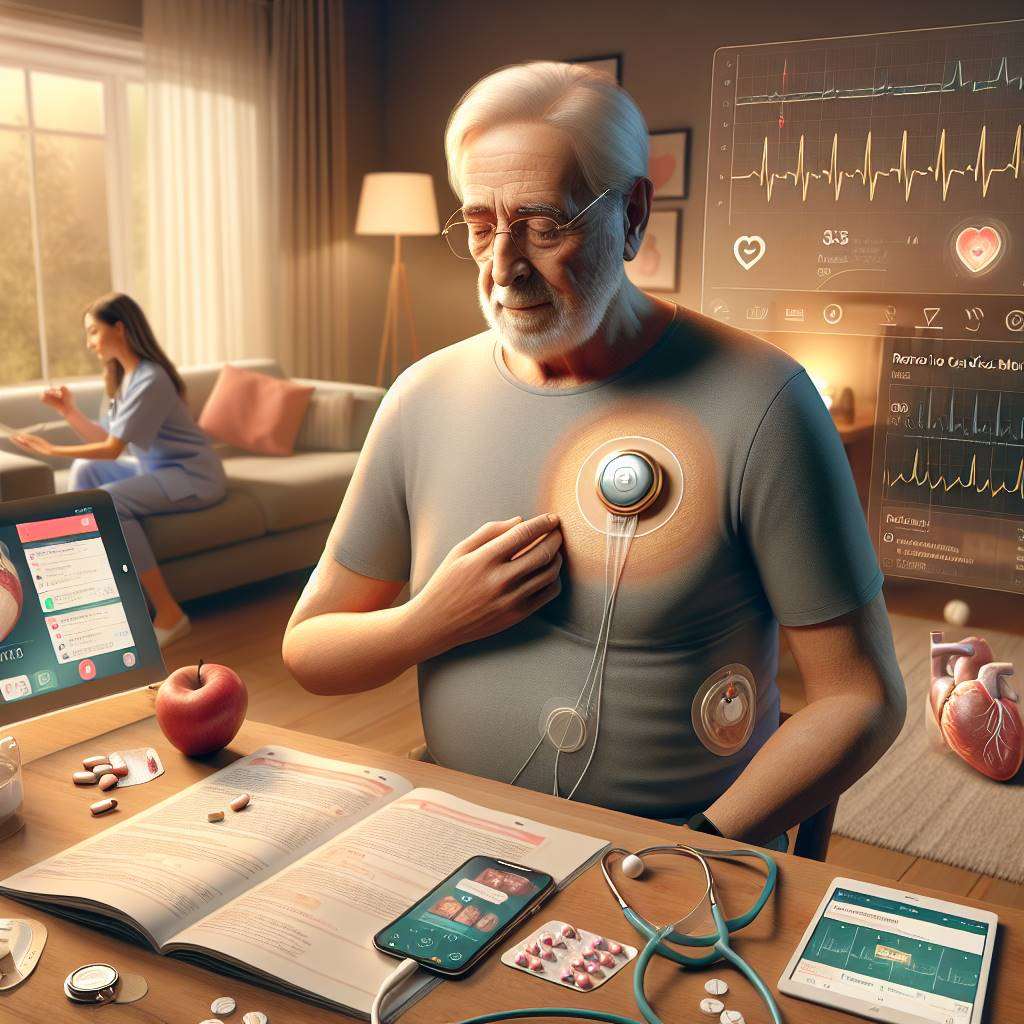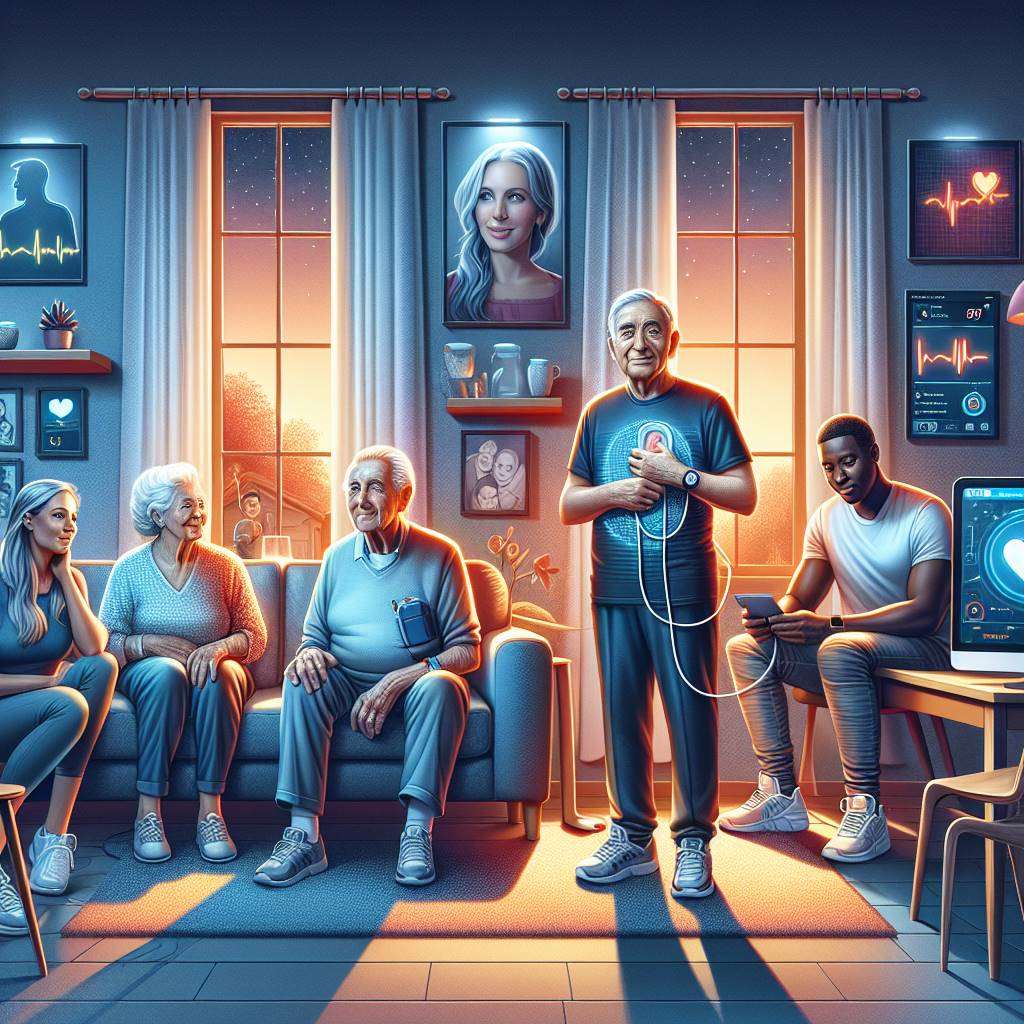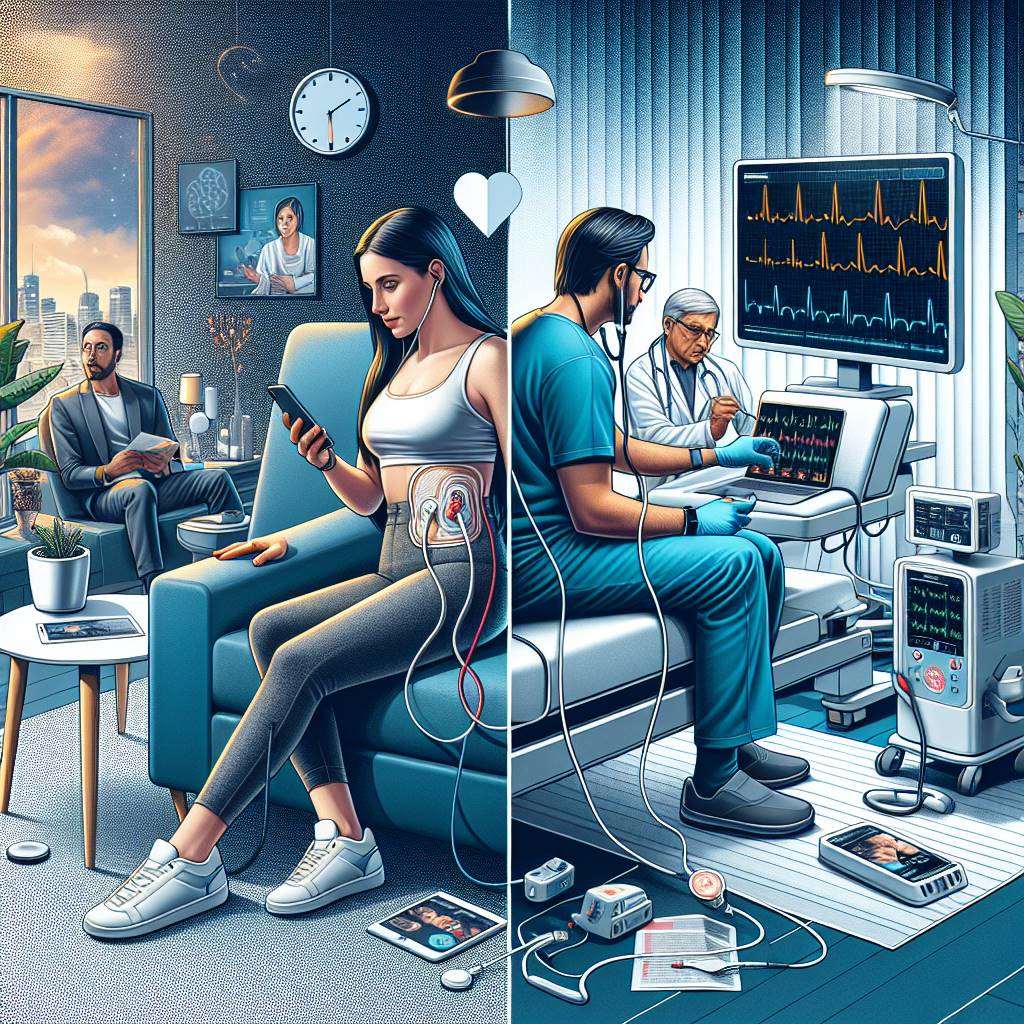Remote monitoring of Automatic Implantable Cardioverter Defibrillators (AICDs) is a revolutionary approach in cardiac care. It allows healthcare providers to track a patient’s heart health and device performance remotely. This technology is crucial for patients with serious heart conditions, as it ensures timely interventions and reduces the need for frequent hospital visits.
Medical disclaimer: This content is for general awareness and does not replace a doctor’s consultation. For diagnosis or treatment decisions, consult a qualified specialist.
By using advanced communication systems, remote monitoring of AICDs provides real-time data to doctors, improving patient outcomes. It is especially beneficial for individuals in rural or underserved areas, where access to specialized cardiac care may be limited. Understanding how this system works and its benefits can empower patients to take an active role in managing their heart health.
What Is Remote Monitoring for AICDs and Why It Matters?
Remote monitoring for AICDs involves the use of wireless technology to transmit data from the implanted device to healthcare providers. This data includes information about the patient’s heart rhythm, device functionality, and any irregularities detected by the AICD. The system allows doctors to monitor patients without requiring them to visit the clinic frequently.
This approach is particularly important for patients with severe cardiac arrhythmias or those at risk of sudden cardiac arrest. By providing continuous oversight, remote monitoring helps in early detection of potential issues, ensuring timely medical intervention. It also reduces the burden on healthcare systems by minimizing unnecessary hospital admissions.
Remote monitoring is a game-changer for individuals living in remote areas, as it bridges the gap between patients and specialized cardiac care. With advancements in technology, this system has become a cornerstone of modern cardiac health management.

How Remote Monitoring of AICDs Works: A Step-by-Step Guide
The process of remote monitoring for AICDs involves several key steps to ensure seamless communication between the implanted device and healthcare providers. Here’s how it works:
- The AICD, implanted in the patient, continuously monitors heart rhythms and detects abnormalities.
- A transmitter device, usually kept at the patient’s home, collects data from the AICD wirelessly.
- The transmitter sends this data to a secure server via the internet or cellular networks.
- Healthcare providers access the data through specialized software, allowing them to analyze the patient’s condition in real time.
- If any irregularities are detected, the medical team contacts the patient for further evaluation or treatment.
This step-by-step process ensures that patients with cardiac conditions receive continuous care without frequent hospital visits. It also allows doctors to adjust treatment plans based on real-time data, improving overall patient outcomes.
Top Benefits of Remote Monitoring for AICD Patients
Remote monitoring of AICDs offers numerous benefits for both patients and healthcare providers. One of the most significant advantages is the ability to detect potential issues early, reducing the risk of complications. This proactive approach can save lives, especially for patients at high risk of sudden cardiac events.
Another key benefit is the convenience it provides. Patients no longer need to visit the hospital frequently for routine check-ups, saving time and reducing stress. This is particularly valuable for individuals living in rural areas or those with mobility challenges.
Additionally, remote monitoring improves the efficiency of healthcare systems. By reducing unnecessary hospital visits and admissions, it allows doctors to focus on patients who require immediate attention. Overall, this technology enhances the quality of care for cardiac patients while promoting better health outcomes.
Can Remote Monitoring Improve AICD Patient Safety?
Yes, remote monitoring significantly enhances the safety of patients with AICDs. By providing continuous oversight of the device and the patient’s heart health, it ensures that any abnormalities are detected early. This early detection allows for timely medical interventions, reducing the risk of severe complications such as sudden cardiac arrest.
Remote monitoring also minimizes the risks associated with delayed diagnosis. For example, if an AICD malfunctions or the patient develops a new cardiac condition, the system alerts healthcare providers immediately. This rapid response capability is crucial for maintaining patient safety.
Furthermore, the data collected through remote monitoring helps doctors make informed decisions about treatment adjustments. This personalized approach to care enhances patient safety and improves long-term outcomes for individuals with cardiac conditions.
Understanding the Technology Behind AICD Remote Monitoring
The technology behind remote monitoring of AICDs is a combination of advanced medical devices and communication systems. The AICD itself is equipped with sensors that monitor heart rhythms and detect abnormalities. These sensors collect data continuously, ensuring that no critical information is missed.
The transmitter device plays a crucial role in this system. It uses wireless technology, such as Bluetooth or cellular networks, to transfer data from the AICD to a secure server. This server acts as a central hub, storing patient information and making it accessible to healthcare providers.
Specialized software is used to analyze the data and generate reports for doctors. This software is designed to identify potential issues, such as device malfunctions or irregular heart rhythms, ensuring that patients receive timely care. The integration of these technologies makes remote monitoring a reliable and effective solution for managing cardiac health.
Who Can Benefit Most from AICD Remote Monitoring?
Remote monitoring of Automatic Implantable Cardioverter Defibrillators (AICDs) is particularly beneficial for patients with a history of severe arrhythmias or those at risk of sudden cardiac arrest. Individuals who live in remote areas or have limited access to healthcare facilities can also gain immense advantages from this technology.
Patients with chronic conditions such as heart failure or those who have undergone recent cardiac surgeries are ideal candidates. Remote monitoring ensures that their device's performance and any potential issues are tracked in real-time, reducing the need for frequent hospital visits.
Additionally, elderly patients or those with mobility challenges can experience improved quality of care and convenience. This technology empowers both patients and healthcare providers by offering timely insights into the patient's cardiac health.

How Remote Monitoring Detects AICD Issues Early
Remote monitoring systems for AICDs work by continuously transmitting data from the implanted device to a secure server. This data includes information about the heart's rhythm, device battery status, and any irregularities detected by the AICD.
Healthcare providers can access this data in real-time, enabling them to identify potential issues such as device malfunctions, low battery levels, or abnormal heart rhythms. Early detection of these problems allows for prompt intervention, which can prevent complications and improve patient outcomes.
For example, if the AICD detects a life-threatening arrhythmia, the remote monitoring system can alert the healthcare team immediately. This proactive approach ensures that patients receive timely care, even before symptoms become apparent.
Is Remote Monitoring of AICDs Reliable and Accurate?
Remote monitoring of AICDs is highly reliable and accurate, thanks to advancements in medical technology. These systems are designed to provide precise data about the patient's heart and the device's performance. Studies have shown that remote monitoring can detect issues earlier than traditional in-clinic visits.
One of the key advantages is the ability to continuously monitor the patient's condition without interruptions. This ensures that no critical events are missed. Additionally, the data is transmitted securely, maintaining patient confidentiality and compliance with medical data protection standards.
Healthcare providers trust these systems because they reduce the margin for human error and provide actionable insights. Patients can also feel confident knowing that their cardiac health is being monitored around the clock.
How Remote Monitoring Enhances AICD Follow-Up Care
Remote monitoring significantly improves follow-up care for AICD patients by providing continuous updates on their cardiac health. This eliminates the need for frequent in-person visits, making it a convenient option for both patients and healthcare providers.
With remote monitoring, doctors can track the patient's condition and device performance in real-time. This allows for personalized treatment adjustments based on the latest data. For instance, if the AICD detects irregular heart rhythms, the healthcare team can intervene promptly.
Here are some key benefits of enhanced follow-up care:
- Reduced hospital readmissions.
- Improved patient satisfaction and convenience.
- Timely detection of device or health-related issues.
Overall, remote monitoring ensures that patients receive comprehensive and proactive care, leading to better health outcomes.
What Data Does AICD Remote Monitoring Collect?
AICD remote monitoring systems collect a wide range of critical data to ensure the patient's safety and the device's optimal performance. This data includes:
- Heart rhythm patterns: Information about normal and abnormal rhythms.
- Device performance: Battery status, lead integrity, and device functionality.
- Arrhythmia detection: Episodes of tachycardia, bradycardia, or other irregularities.
- Therapy delivery: Records of shocks or pacing provided by the AICD.
This data is transmitted securely to the healthcare provider, enabling them to monitor the patient's condition remotely. By analyzing this information, doctors can make informed decisions about treatment adjustments or device maintenance, ensuring the patient's safety and well-being.
Remote Monitoring vs. In-Person AICD Check-Ups: Key Differences
Remote monitoring of Automatic Implantable Cardioverter Defibrillators (AICDs) has revolutionized cardiac care. Unlike traditional in-person check-ups, remote monitoring allows real-time data transmission from the AICD to healthcare providers, ensuring continuous oversight of a patient’s heart health.
In-person check-ups require patients to visit clinics, which can be time-consuming and inconvenient, especially for those in rural areas. Remote monitoring eliminates this need, offering a more efficient and patient-friendly alternative. It also enables early detection of potential issues, reducing the risk of complications.
However, in-person visits remain essential for certain procedures, such as device adjustments or battery replacements. Combining both approaches ensures comprehensive care for AICD patients.

How to Set Up Remote Monitoring for Your AICD
Setting up remote monitoring for your AICD is a straightforward process that enhances your cardiac care. First, your healthcare provider will provide a compatible monitoring device, often a small transmitter that connects to your AICD wirelessly.
Next, the transmitter is placed in your home, typically near your bed, to ensure regular data uploads. It sends information about your heart rhythm and device performance to a secure server, which your doctor can access. Some systems also use mobile apps for added convenience.
- Ensure the transmitter is plugged in and connected to a stable internet connection.
- Follow your doctor’s instructions for periodic checks or updates.
- Contact your provider if you experience any issues with the device.
Remote monitoring empowers patients by providing continuous oversight, reducing the need for frequent clinic visits.
Common Challenges in AICD Remote Monitoring and Solutions
While AICD remote monitoring offers numerous benefits, it is not without challenges. One common issue is connectivity problems, as the transmitter relies on a stable internet connection. Patients in areas with poor network coverage may face difficulties.
Another challenge is patient compliance. Some individuals may forget to keep their transmitter plugged in or fail to report symptoms promptly. Additionally, technical glitches in the monitoring system can delay data transmission to healthcare providers.
Solutions include educating patients about the importance of compliance, providing technical support for troubleshooting, and using backup systems to ensure uninterrupted monitoring. Regular follow-ups with your doctor can also address any concerns and improve the overall effectiveness of remote monitoring.
Future Innovations in AICD Remote Monitoring Technology
The future of AICD remote monitoring is promising, with advancements in technology paving the way for even better patient care. Artificial intelligence (AI) is being integrated into monitoring systems to analyze data more accurately and predict potential cardiac events.
Wearable devices, such as smartwatches, are also being developed to complement AICDs, providing additional insights into a patient’s heart health. These devices can track vital signs like heart rate and oxygen levels, offering a more comprehensive view of the patient’s condition.
| Current Technology |
Future Innovations |
| Basic data transmission |
AI-driven analytics |
| Standalone transmitters |
Wearable integrations |
| Manual troubleshooting |
Automated issue resolution |
These innovations aim to make remote monitoring more efficient, accurate, and user-friendly, ensuring better outcomes for AICD patients.
FAQs About Remote Monitoring for AICD Patients
Q: What is AICD remote monitoring?
A: It is a system that allows your AICD to transmit data about your heart rhythm and device performance to your doctor, ensuring continuous care.
Q: Is remote monitoring safe?
A: Yes, it is a secure and reliable method for managing your cardiac health. All data is encrypted to protect your privacy.
Q: Do I still need in-person visits?
A: Yes, while remote monitoring reduces the frequency of visits, certain procedures like device adjustments still require in-person care.
For more information, consult your healthcare provider to understand how remote monitoring can benefit your specific condition.
Best Aicd Implantation Doctors in India
Dr. Balbir Singh, affiliated with Medanta - The Medicity, Gurugram, is a renowned cardiologist with a specialization in electrophysiology. With over 30 years of experience, he is internationally recognized for his expertise in managing AICDs. Another expert is Dr. Praveen Chandra from Fortis Escorts Heart Institute, New Delhi, a leading interventional cardiologist with 25+ years of experience in advanced cardiac care.
Learn more on best aicd implantation doctors in india
Best Aicd Implantation Hospitals in India
Fortis Escorts Heart Institute, New Delhi, a NABH and JCI-accredited hospital, is a leader in advanced cardiac care, offering cutting-edge AICD monitoring services. Medanta - The Medicity, Gurugram, another top-tier hospital, is renowned for its multidisciplinary cardiac team and international patient services. Both hospitals are equipped with state-of-the-art technology and have a track record of successful outcomes.
Find more best aicd implantation hospitals in india
Aicd Implantation Cost in India
The cost of Remote Monitoring of AICDs in India typically ranges between ₹50,000–₹1,50,000 (USD 600–1,800), depending on factors like the hospital, doctor’s expertise, and monitoring duration. This is significantly lower than costs in Western countries. Most hospitals offer insurance coverage and financing options to ensure affordability for patients.
Learn aicd implantation cost in india
Aicd Implantation Treatment in India
In India, Remote Monitoring of AICDs involves implanting the device and connecting it to a secure monitoring system. Advanced technologies like wireless telemetry and cloud-based platforms are used to transmit real-time data to healthcare providers. Recovery is quick, with most patients resuming normal activities within a week. Indian hospitals adhere to global medical protocols and integrate the latest innovations for optimal patient care.
Learn on Aicd Implantation Treatment in India
FAQs
What is an AICD?
An AICD (Automatic Implantable Cardioverter Defibrillator) is a device implanted in the chest to monitor and treat abnormal heart rhythms, such as arrhythmias.
How does remote monitoring of AICDs work?
Remote monitoring uses wireless technology to transmit data from the AICD to healthcare providers, allowing real-time tracking of heart activity and device performance.
Is remote monitoring safe?
Yes, remote monitoring is highly safe. It uses secure, encrypted systems to protect patient data and ensure accurate monitoring.
What are the benefits of remote monitoring?
Benefits include early detection of issues, reduced hospital visits, improved patient outcomes, and convenience for both patients and doctors.
Who is eligible for AICD remote monitoring?
Patients with an implanted AICD for conditions like ventricular tachycardia or heart failure are eligible for remote monitoring.
What happens if an abnormal rhythm is detected?
If an abnormal rhythm is detected, the AICD can deliver a shock to restore normal rhythm, and the healthcare team is alerted for further action.
How often is the device monitored?
Monitoring frequency depends on the patient’s condition but is typically performed daily or as needed based on the device's alerts.
Can remote monitoring replace in-person check-ups?
While remote monitoring reduces the need for frequent visits, periodic in-person check-ups are still necessary for comprehensive care.
Are there any risks associated with remote monitoring?
There are minimal risks, primarily related to data transmission. However, modern systems are designed to ensure reliability and security.
How can I access remote monitoring services in India?
Leading hospitals like Fortis Escorts and Medanta offer remote monitoring services. Consult your cardiologist for more details.
Understanding AICD Use: Key Considerations for Patients
As advancements in cardiac care continue to evolve, patients with Automated Implantable Cardioverter Defibrillators (AICDs) face important questions regarding their treatment options. One critical aspect is MRI compatibility, which can significantly impact patient care. For insights on this topic, read about MRI compatibility in modern AICDs and what patients should inquire about during consultations.
Additionally, the age of patients receiving AICDs is shifting, with more younger individuals being implanted. Understanding the implications of AICD use in teens and adults under 40 is essential for both patients and healthcare providers. Explore the considerations surrounding this demographic in our blog on AICD use in younger patients.
By staying informed about these critical topics, patients can engage in meaningful discussions with their healthcare teams, ensuring they receive the best possible care tailored to their unique needs.